

Ten professors and staff members in LAS are among the recipients of the Presidential Initiative to Celebrate the Impact of the Arts and the Humanities. The $2 million initiative, launched by University of Illinois President Tim Killeen, is aimed at emphasizing the impact and influence of the arts and humanities across Illinois.
More than 50 proposals from across the University of Illinois System were submitted for the initiative and 14 were selected. Of the 14 selections, all but one was allocated $100,000 or more and eight will receive $150,000 or more. By comparison, the average grant award in 2016 by the National Endowment for the Arts (NEA) was $25,000 and fewer than 40 NEA grants totaled more than $100,000, according to Grantmakers in the Arts.
“The arts and the humanities are essential to providing a well-rounded education, crucial to fostering conscientious citizenship in communities, and foundational for the creative contributions that are needed within every economic sector,” Killeen said. “This initiative sends a message around the state and the country that the arts and humanities are a priority here.”
The original plan was to provide up to $1 million each year over the next two years to support faculty projects. But Killeen said so many strong proposals were received, including many multi-year and multi-university collaborative initiatives, that initial funding was increased to cover more projects over a two-year period. The program will be revisited in 2020.
“Although science and technology are rightly celebrated for their driving roles in our knowledge-based economy, we hold the arts and the humanities in equal reverence,” Killeen said. “This initiative will leverage the collective scholarship and creativity of the U of I System in these fields to serve as a catalyst for initiatives that will serve the public good.”
The program is supported by the offices of both the President and the Executive Vice President, using funds devoted to faculty development. Projects and funding amounts to professors in the College of LAS include:
The Bilingual Advantage Starts at Home, $140,000
With nearly one in four Illinois families with school-age children speaking languages other than English in the home, the Bilingual Advantage Starts at Home project, led by Melissa A. Bowles, professor of Spanish and Portuguese and linguistics, and Kim Potowski at the Chicago campus, aims to raise awareness of the lifelong benefits associated with being bilingual. Undergraduate and graduate students in Urbana-Champaign and Chicago will design educational materials and brochures for students, teachers, school administrators and parents across Illinois, and also will provide direct outreach. The project will reach an estimated 2,600 primary school teachers over two years, and will target both urban and rural areas across Illinois with the highest concentration and the fastest growth of children who speak languages other than English.
A Year of Creative Writers at Illinois, 2020, $150,000
Creative writers are noteworthy chroniclers of social and cultural moments, often shedding light on the human condition. This proposal, led by Antoinette Burton, professor of history, will foster conversations with award-winning creative writers by bringing them to audiences across the U of I System. Writers at all stages of their careers will highlight a range of genres and share their reflections on the creative-writing process in classrooms, community readings and book signings. The year-long celebration will culminate in a “Festival of Writers” event in Urbana-Champaign in November 2020 with a series of events featuring authors from big names to emerging voices.
The Innovation Illinois Community Laboratory + Interactive Exhibit, $150,000
This project, led by Anita Chan, professor of Asian American studies, Benjamin Grosser, Karrie Karahalios, and Karen Rodriguez’G, will highlight the rich contributions of arts, humanities and civic partnerships in famed innovations from Urbana-Champaign, such as the first wheelchair bus system, the first music composition created by a computer and first graphical web browser. The project leaders will develop a year-long course for freshmen that delves into case studies of innovations that brought artists and humanists into collaboration with scientists and engineers. The course will teach design thinking as well as skills in multidisciplinary methods and will culminate in student projects that model such processes. A traveling exhibit that highlights the best projects will be hosted at key sites, showcasing innovation prototypes for the public, including alumni.
The Art of Medicine, $100,000
This interdisciplinary project, led by Stephanie M. Hilger, Germanic languages and literatures, and Justine S. Murison, professor of English, is a collaboration among faculty at all three U of I System universities with the goal of bridging the humanities and health sciences for students seeking careers in health. One aspect will be dedicated to the building of a medical humanities curriculum for both undergraduates and medical students in the new Carle Illinois College of Medicine. Another involves creating “public squares” that will bring together scholars, students, community experts, activists, artists and health professionals to discuss various health issues impacting the communities surrounding the three universities.
The Hip-Hop Xpress, $150,000
Led by Malaika McKee, professor of African American studies, with Adam Kruse and William Patterson from the Urbana Champaign campus, and Tiffani Saunders of the Springfield campus, the Hip-Hop Xpress is a project involving the creation of an internet-enabled school bus to be equipped as a multi-user music production and recording studio. Using music, dance, visual arts and technology, the bus will travel to communities and classrooms across the state, teaching youth about African-American history as well as cultural innovations spurred on by Hip-Hop. The mobile classroom will work with U of I Extension offices to reach youth organizations across Illinois. The project’s goals are to further integrate the arts into people’s lives and help develop Hip-Hop studies on all three campuses.
Global Film History from the Edges: Engineering a Comparative Public Humanities, $150,000
This project, led by Rini Bhattacharya Mehta, professor of comparative and world literature and religion, will create an online archive and research platform for the study of cinema on a global scale. Project leaders will work with faculty and students from all three universities to create three modules: one that explores how films have influenced and are influenced by the world’s greatest cities; one that explores the production of films on a world-wide scale in terms of power and the flow of capital; and one that explores the role of gender and the star-effect in films across the world. The resulting massive data base will be conjoined with critical and analytical tools in a user-friendly interface. Scholars, students and the public will be able to use the publicly available platform to explore film history from regional, linguistic and comparative perspectives.
The Humanities Innovating New Knowledge (THINK), $150,000
Led by Kathryn J. Oberdeck, professor of history, in collaboration with Barbara Ransby and Jennifer Brier of the Chicago campus, and Devin Hunter of the Springfield campus, THINK will bring together more than 30 faculty from across the U of I System’s three universities as well as community leaders to create an infrastructure for producing arts- and humanities-based exhibits and events in Chicago, Urbana-Champaign and Springfield. The project will include educational opportunities for students, pop-up installations that engage historical and contemporary issues in these respective communities, and scholar-practitioner working groups to address social problems, such as violence, wealth disparity, incarceration and human rights.
The Mythic Mississippi: I-Heritage as Public Engagement and Economic and Social Development, $180,000
This public engagement project, led by Helaine Silverman, professor of anthropology, and Devin Hunter from the Springfield campus, will help a selection of downstate Illinois communities to identify points of cultural heritage as a means of creating themed tourism routes along and near the Mississippi River. Faculty and students from the two campuses will conduct research collaboratively with local governmental, business and educational partners aimed at achieving sustainable strategies and effective policies that will foster local economic and social development. A website and high school-level teaching modules also will be produced. The project will culminate with a national symposium on the use of heritage tourism for community development.
Collaborative Reinstallation of the Ancient Andean collections at Krannert Art Museum, $145,000
This project, spearheaded by Kasia Szremski, associate director of the Center for Latin American and Caribbean Studies, along with Allyson Purpura and Jon Seydl from Urbana-Champaign and Brian Bauer from the Chicago campus, will update how the approximately 600-piece collection of ancient and colonial Andean art is presented at the Krannert Art Museum in Champaign. The internationally acclaimed collection, acquired by the museum in 1967, includes some exceedingly rare objects such as a fully intact khipu, a device made of knotted cords used by the Inka for record-keeping and sending messages. Informed by the latest interdisciplinary research, the project will develop new interpretative frameworks for the exhibition, including storylines that will explore notions of identity and power, labor, agricultural practices and the politics of indigeneity. The project also will foster community outreach, and an interactive, digital platform that will connect local and global users to the collection and to each other.


